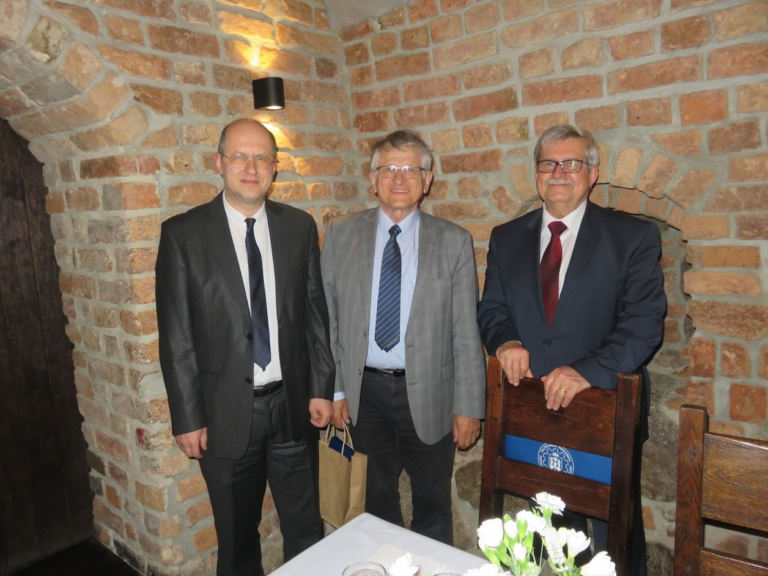Start - Research and development works - Program OPUS-19
Project w programie OPUS-19
The National Science Centre (NCN) awarded the research team managed by Prof. Marian Kampik, Ph.D. Eng funds for the implementation in the years 2021 - 2023 of the research project entitled "System for ensuring measuring consistency of impedance components in relation to a pattern based on the quantum effect of Hall". The project is financed through the OPUS-19 programme.
The implemented project concerns electrical impedance patterns and is closely related to the so -called The "new" SI system, which is based on physical constant, including She stood von Klitzing and stood Josephson. Although it is currently possible to implement a resistance unit by direct reference to the physical constant, there are no known quantum phenomena, allowing direct implementation of the capacity and inductance unit. The only option is to compare the capacity or inductance with the resistance determined with the help of a quantum pattern of resistance using the quantum effect of Hall. To this end, it is necessary to use appropriately accurate systems, called impedance comparators. The principle of operation of these systems is based on a direct comparison of the Device Under Test, DUT with a reference pattern (Reference) with enough high accuracy and stability. There are differential and quoting compression systems. Currently, quota measurements dominate in impedance measurements, mainly due to the dynamic development of quantum and digital alternating voltage sources. In such measurements, DUT parameters are calculated on the basis of measuring the relationship of unknown impedance for reference impedance with well -known parameters. The most accurate comparisons of impedance require the use of the so-called Four-Terminal Pair, 4TP. An unsolved problem in the 4TP comparatory systems is the issue of reducing the uncertainty of impedance measurements to level 10-6 without the need for a very expensive quantum multi-channel alternating voltage pattern, using the Josephson effect. Another scientific problem is to develop effective testing methods for such an accurate measuring system, which will allow you to estimate the uncertainty of the system and detect errors at the stage of building the prototype. Both of the above -mentioned problems will be solved as part of the project. The system will be comprehensively tested using a traditional method with calibrated patterns and using the so -called triangular methods, which is innovative in the area of quoting and in which the development of the research team made a large contribution. On the basis of the obtained research results, the uncertainty budget will be developed and conclusions regarding the final accuracy of the system will be drawn.

Explorer of the quantum phenomenon of Hall's effect, Nobel Prize winner Prof. Klaus von Klitzing (in the middle), rector of the Poznań University of Technology Prof. Tomasz Łodygowski (right) and project manager, Prof. Marian Kampik.
The effect of the project will be to develop a system for impedance comparisons, which will be more accurate than the currently available systems. The system will enable, among others, to transfer the measure from a resistance unit based on the quantum pattern of resistance, using the quantum effect of Hall, on capacity and inductance patterns. In addition, it will allow for precise impedance comparison of various natures and impedance measurements with very high accuracy. Measurements of electrical impedance are currently common in the production and study of electrical and electronic devices, as well as in the design, production, and testing of electronic systems. For example, different types of sensors: retaining thermometers, capacitive displacement sensors, proximity sensors (including touch screens), barometers and hygrometers, transform non -electrical input size into electrical impedance. Impedance spectroscopy plays a very important role in nondestructive research, such as the chemical and biological characteristics of solids, liquids, and biological materials, and in measuring the electrical properties of materials (permeability, permeability, dielectric losses), also based on accurate measurement of impedance system or sample. The metrological consistency of impedance measurements, understood as a reference to measurement results at any level of accuracy to state patterns, is therefore a prerequisite for the credibility and comparativeness of the results of such analyses. Ensuring consistency in impedance measurements requires the use of reference systems and measuring systems, allowing measurable impedance to be compared with a high-accuracy pattern. The developed system will be useful for at least national metrological institutes, whose role in Poland is the Central Office of Measures and other metrological laboratories.









